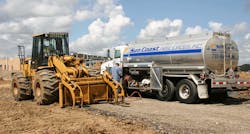Tips to Keep Tier 4 Engines Operating at Peak Performance
Off-highway and on-highway equipment powered by Tier 4 engines feature engine technology that requires more preventive maintenance attention than prior engine technologies. Therefore, the following steps are recommended to maximize the performance of Tier 4 engines.
Use ultra-low-sulfur diesel. Equipment owners no longer have to worry about introducing the wrong fuel into their vehicles since ultra-low-sulfur diesel (ULSD) is the only type of diesel fuel Tier 4 engines can burn, and the EPA now mandates that nationwide. Failure to use USLD in Tier 4 engines will result in severe damage or even failure to the engine, plus its fuel system, the diesel particulate filtration system, and exhaust aftertreatment system. Be sure to source USLD from only reputable fuel suppliers.
Breedlove is director of Fleet Operations for Sun Coast Resources, a wholesale fuel and lubricant marketer.
Clean storage tanks. Delivering high-quality fuel into clean storage tanks is critically important to ensure reliable engine performance. Storage tanks, however, must be routinely cleaned and regularly maintained to reduce the chance of fuel contamination. The analogy often cited is most of us would not want to drink clean water from a dirty glass. The same principle applies for adding clean fuel into a dirty or contaminated storage tank. Tanks can also be susceptible to biologic contamination, particularly in a hot and humid climate. Contaminated fuel will most certainly negatively affect engine performance.
Maintain filtration system. It’s easy to ignore the storage tank and fuel-pump filters, but they play a critical role in minimizing fuel contamination, particularly at dirty, dusty, and windy job sites. Dirty filters wreak havoc on Tier 4 engines because particles will bypass the filtration system and contaminate the fuel. Compared to the costs associated with engine damage, filters are inexpensive. It is also understood fleet operators must stay on top of filtration maintenance based on the OEM’s guidelines.
It is also important to maintain a watertight storage and fueling system to prevent water from contaminating the fuel, especially in the Texas Gulf Coast region.
Never ignore the check engine light. All vehicles are equipped with electronic control modules, often referred to as the "brain" of the engine. When the check engine light or another fault code appears, it is important to react quickly to identify and repair the source of the problem to prevent engine damage.
Vehicle maintenance schedules and engine manufacturer guidelines must be followed to save time and money, as well as for optimal engine performance over the long haul.
